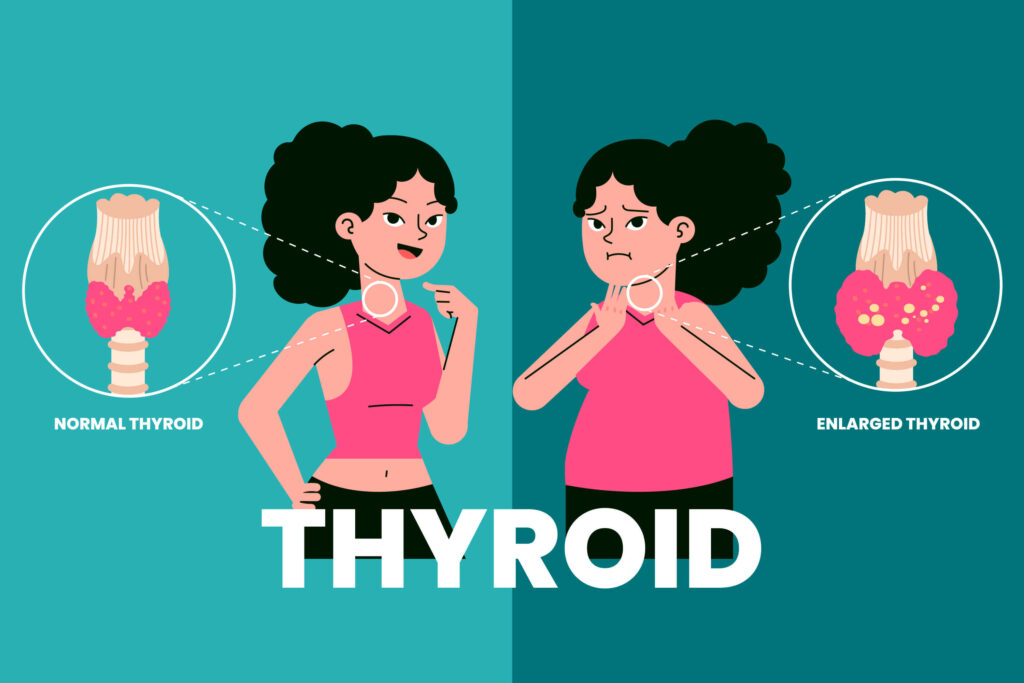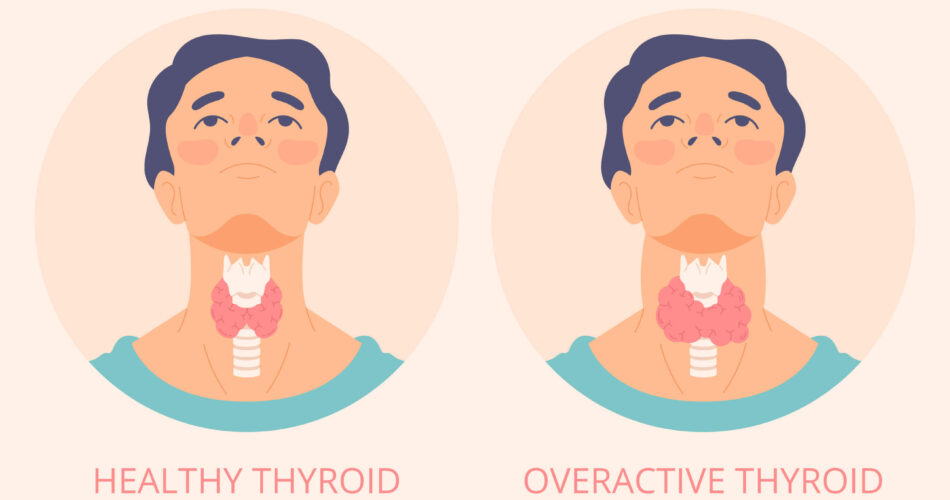The thyroid gland plays a vital role in regulating your metabolism, energy levels, and overall health. However, when something goes wrong, it can lead to various symptoms that are often mistaken for other conditions. If there are unexplained changes in your body, you may be experiencing symptoms of thyroid problems.
Find out the connection through this guide and understand when to seek medical advice from an endocrinologist near you!
Types of Thyroid Disorders
Before discussing the symptoms of thyroid problems, you must first understand that there are 2 types of thyroid conditions to watch out for. These conditions can provide opposite symptoms, require treatment, and affect the physical appearance differently. Let’s discuss them below!

Hyperthyroidism (Overactive Thyroid Illness)
One of the most common types of thyroid problems is hyperthyroidism. This problem involves the thyroid gland producing too much thyroid hormones, thus resulting in its other name an overactive thyroid condition.
The most common cause of hyperthyroidism is an underlying health condition that affects the thyroid gland. This situation can result in the increased production of thyroid hormones thyroxine (T4) and triiodothyronine (T3). Some of the common thyroid diseases that often trigger excessive production are the following:
- Thyroiditis – Involves inflammation of the thyroid gland that pushes the excess hormones into the bloodstream. Thus, resulting in hyperthyroidism. T
- Overactive thyroid nodules – A common form of hyperthyroidism where the thyroid gland becomes enlarged forming a goiter. When you have this condition, the thyroid produces an increased amount of hormones resulting in noncancerous lumps, which is the growth you see on the neck.
Suffering from hyperthyroidism is difficult as one of the common symptoms of thyroid problems involves a physical change. The lump on the neck area can affect your mental health, leading to constant anxiety for the rest of your life. That’s why it’s ideal to get checked immediately to avoid such problems.
Hypothyroidism (Underactive Thyroid Illness)
On the contrary, hypothyroidism is a type of thyroid dysfunction where there’s little thyroid hormone levels produced. When there’s too little thyroid hormone produced, there’s not enough hormones that pass into the bloodstream.
The most common cause of hypothyroidism is the autoimmune disease called Hashimoto’s disease. However, other causes can result in the occurrence of symptoms of hypothyroidism.
These risk factors are the following:
- Birth defect – Being born without the thyroid gland can lead to hypothyroidism.
- Postpartum thyroiditis – Pregnant women can also experience thyroiditis. Females usually develop inflammation of the thyroid gland due to pregnancy.
While goiter is a common change in the body due to thyroid problems, other complications can happen when you have hypothyroidism. The low levels of produced hormones can affect the metabolism and other aspects of your body. That’s why seeking an endocrinologist is a must when it comes to thyroid problems.
Common Symptoms of Thyroid Problems
As mentioned there are 2 types of thyroid conditions, and both have a different effect on your body. To better understand how this dysfunction can affect your health, here’s a simple guide:
Unexplained Weight Gain or Weight Loss

One of the most noticeable signs of thyroid disorders is sudden weight changes.
- Hypothyroidism: Leads to weight gain due to a slow metabolism.
- Hyperthyroidism: Causes rapid weight loss due to an overactive metabolism.
If you’re experiencing unexpected weight changes without altering your diet or exercise habits, it may be time to get your thyroid checked.
Persistent Fatigue and Low Energy

Feeling tired all the time? A sluggish thyroid could be draining your energy levels.
- Hypothyroidism: Causes constant fatigue, even after a full night’s sleep.
- Hyperthyroidism: Can lead to difficulty sleeping, causing exhaustion during the day.
Mood Swings, Anxiety, or Depression

Your thyroid hormones play a key role in brain function and emotional well-being.
- Hypothyroidism: Often leads to depression, brain fog, and difficulty concentrating.
- Hyperthyroidism: Can cause anxiety, nervousness, and irritability.
If your emotions feel out of control, it might not be just stress—it could be your thyroid.
Hair Loss and Skin Changes

Your thyroid influences hair growth and skin health.
- Hypothyroidism: Can lead to dry skin and brittle hair that falls out easily.
- Hyperthyroidism: May cause hair thinning and excessive sweating.
If your hair or skin has changed drastically, your thyroid may be to blame.
Irregular Heartbeat and High Blood Pressure
The thyroid gland affects your heart rate and circulation.
- Hyperthyroidism: Can cause a rapid or irregular heartbeat (palpitations).
- Hypothyroidism: May lead to a slow heart rate and low blood pressure.
These symptoms should never be ignored, as they could indicate a serious underlying issue. It’s best to get it checked out before it results in a worse situation (i.e., heart failure).
Why are the symptoms of thyroid problems considered alarming?
While the symptoms of hyperthyroidism and hypothyroidism can be contradicting, both scenarios should not be taken for granted. These signs can have a huge impact on your health if not addressed immediately. Outcomes like the occurrence of heart disease and other health complications can arise due to the continuous severity of the symptoms.
In that case, prioritizing your health must come first to prevent any complications due to poor thyroid health. A simple blood test can help you learn if you have hyperthyroidism or hypothyroidism. Based on the findings, you can already take the necessary steps, such as following the treatment method your endocrinologist will require.
When to Visit An Endocrinologist Near Me to Get Tested?

If you’re experiencing multiple symptoms from the list above, it’s crucial to get tested. Common diagnostic tests may include a Physical exam, Thyroid Stimulating Hormone Test, Blood test, and Thyroid Biopsy.
You should consider getting tested for the following reasons:
- You have a family history of thyroid disorders.
- You’re experiencing unexplained fatigue, weight changes, or mood swings.
- You’ve noticed irregular menstrual periods or fertility issues.
- Your hair is thinning, and your skin has become unusually dry or sweaty.
- You noticed that there’s a lump in front of the neck.
Whether you match any of the mentioned scenarios, it’s best to schedule an appointment immediately.
Finding an Endocrinologist Near Me
An endocrinologist is a medical doctor who knows the endocrine system. Most patients suffering from hormonal problems seek help from this doctor to help regulate their hormones. Thus, making it crucial for you to set an appointment with them due to the occurrence of symptoms of thyroid problems.
Read this related blog about hormonal problem conditions.
There are several ways to find a suitable endocrinologist in the Philippines. For instance, checking doctors using the following options can help:
- Locations – Using location for finding doctors can help if you are seeking doctors near you. (e.g., Endocrinologist in Manila, Endocrinologist in Makati, etc.)
- Hospitals – Several prominent hospitals in the metro are known to offer quality healthcare services.
- Healthcare platforms – There are online telehealth platforms like NowServing that can help you connect with licensed doctors for consultation, diagnostic tests, purchasing medications, and getting medical certifications.
How to Book A Trusted Endocrinologist on NowServing
If you decide to use NowServing to consult with an Endocrinologist, you must follow the following steps:
- Access the website link to view the list of endocrinologists in the Philippines.
- Choose the best endocrinologist doctor near you from the list by pressing the “Book Appointment” button.
- Select if you are an old or new patient of your preferred doctor.
- Fill up the form to continue the booking process.
- Wait for the confirmation message.
Besides that, you can also download the NowServing app to your device for more seamless access to their various healthcare services.
Frequently Asked Questions
Is it possible to check my thyroid health at home?
Yes, you can check your thyroid gland at home using a simple trick. You only need a mirror and a glass of water for this test. Check this step-by-step info on how to do it at home:
- Make sure you have a clear view of your neck using a mirror.
- Focus your eyes on the lower part at the front of your neck.
- Tilt your head back, and drink your glass of water. As you swallow, check your neck for any lumps or enlargement of the neck.
- If you think there’s a noticeable lump or enlarged thyroid gland, it can be a sign of a thyroid condition.
Can thyroid problems be treated?
The right treatment depends on whether you have hypothyroidism or hyperthyroidism. Treatment options include medication, lifestyle changes, and, in some cases, surgery. It’s best to follow the recommended care options to ensure proper thyroid function.
Which habits should I stop to prevent the occurrence of thyroid problems?
To prevent thyroid problems, it is advisable to avoid certain habits that can negatively impact your thyroid health. Some habits to steer clear of include smoking, excessive stress, inadequate sleep, and consuming excessive amounts of processed foods with high levels of sugar and unhealthy fats. Making healthy lifestyle choices can go a long way in maintaining good thyroid health.
Are thyroid problems commonly occurring in women only?
While thyroid problems can affect anyone, they are more common in women compared to men. Women are at a higher risk of developing thyroid disorders, especially during pregnancy and menopause. Both men and women need to be aware of the symptoms of thyroid problems and seek medical advice if needed.
Conclusion
Your thyroid plays a crucial role in your overall health, and recognizing the symptoms of thyroid problems early can make all the difference. If you’re experiencing persistent fatigue, mood swings, weight changes, or any of the other symptoms mentioned, it’s time to take action.
Don’t wait—book an online consultation with an endocrinologist today via NowServing to get the care you need.
Thyroid Health Quiz
Test your knowledge about thyroid problems

